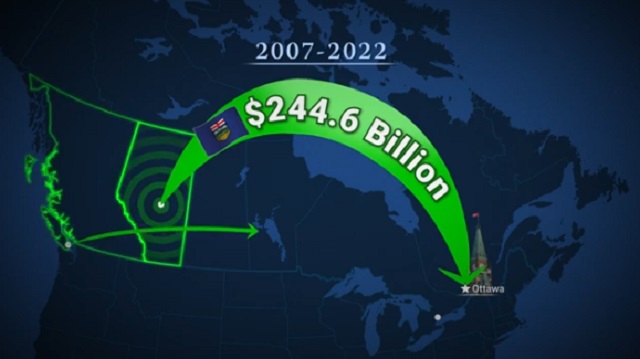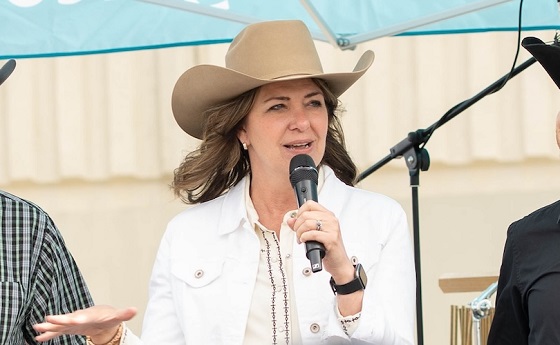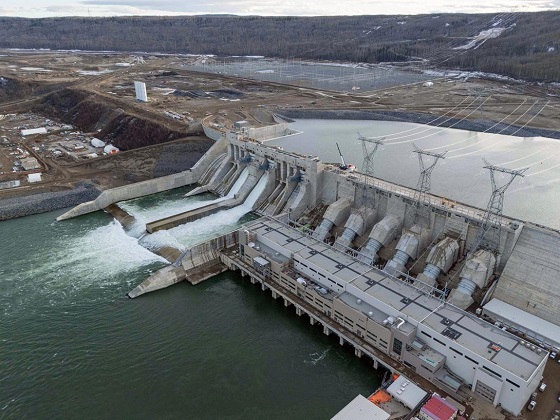Alberta
Albertans continue to contribute disproportionately to Canadian federalism

From the Fraser Institute
By Tegan Hill
Net contribution totaled $244.6 billion between 2007 and 2022
Between 2007 and 2022, Albertans continued to contribute disproportionately to Canadian federalism in terms of the amount of federal taxes paid versus federal spending in the province, finds a new study published today by the Fraser Institute, an independent non-partisan Canadian think-tank.
“It’s clear that Albertans continue to disproportionately contribute to the economic success of the country and to federal finances,” said Tegan Hill, director of Alberta Policy at the Fraser Institute and co-author of Understanding Alberta’s Outsized Contribution to Confederation.
Overall, from 2007 and 2022, Albertans’ contributed $244.6 billion to the federal government in taxes and other payments in excess of the money Ottawa spent or transferred to Alberta – more than five times as much as was contributed (on net) by either British Columbians or Ontarians. The other seven provinces, and most notably Quebec were net recipients of federalism, meaning the amount of revenues collected by the federal government in those provinces was exceeded by the amount of money spent or transferred by Ottawa back to the provinces.

“When Alberta’s economy is strong and prosperous, it benefits the entire nation,” commented Hill.
In 2022, Alberta’s inflation-adjusted GDP growth was the fastest in the country (5 per cent), it also reported the fastest private sector employment growth (7.8 per cent), the highest level of business investment per private sector worker ($36,412) and had the highest net interprovincial migration (56,245 people).
“It is the economic success of Alberta that leads to Albertans contributing more to Canadian federalism than other provinces, which is absolutely something to be encouraged rather than discouraged,” said Hill.
- When Alberta is economically strong, all Canadians benefit, because money is redistributed to other parts of Canada.
- In 2022, despite restrictive federal policies, Alberta continued to contribute disproportionately to the federation.
- Alberta’s 5.0% real GDP growth rate was the fastest in Canada in 2022, accounting for 17.9% of Canada’s real GDP growth, despite being home to 11.6% of the population.
- In 2022, 56,245 Canadian residents relocated to Alberta, representing more than 75% of total net in-migration within Canada.
- Alberta reported the fastest private sector employment growth among the provinces (7.8%) in 2022, accounting for 19.2% of private sector jobs created in Canada.
- Per private sector worker, Alberta attracted $36,412 of business investment, more than double the national average (excluding Alberta).
- From 2007 to 2022, Alberta’s net contribution to the federal finances totalled $244.6 billion—more than five times as much as BC’s ($46.9 billion) or Ontario’s ($41.9 billion). In 2022, Alberta contributed $14.2 billion more to federal revenues than it received back in federal spending.
- If Alberta were an “average contributor” based on the other provinces, rather than a large net contributor, the federal government would have had a fiscal shortfall of $16.9 billion in 2022. For perspective, to cover this net revenue loss, the federal GST rate would need to increase from 5.0% to 7.2%.
- Put simply, without Alberta’s oversized contribution to the federation, Canada would be worse off. To benefit all Canadians, the federal government should focus on supportive policies, not restrictive ones.
Authors:
Alberta
Danielle Smith slams Skate Canada for stopping events in Alberta over ban on men in women’s sports

From LifeSiteNews
The Alberta premier has denounced Skate Canada as ‘disgraceful’ for refusing to host events in the province because of a ban on ‘transgender’ men in women’s sports.
Alberta Premier Danielle Smith has demanded an apology after Skate Canada refused to continue holding events in Alberta.
In a December 16 post on X, Smith denounced Skate Canada’s recent decision to stop holding competitions in Alberta due to a provincial law keeping gender-confused men from competing in women’s sports.
“Women and girls have the right to play competitive sports in a safe and fair environment against other biological females,” Smith declared. “This view is held by a vast majority of Albertans and Canadians. It is also common sense and common decency.”
Women and girls have the right to play competitive sports in a safe and fair environment against other biological females.
This view is held by a vast majority of Albertans and Canadians. It is also common sense and common decency.
Skate Canada‘s refusal to hold events in… pic.twitter.com/n4vbkTx6B0
— Danielle Smith (@ABDanielleSmith) December 16, 2025
“Skate Canada‘s refusal to hold events in Alberta because we choose to protect women and girls in sport is disgraceful,” she declared.
“We expect they will apologize and adjust their policies once they realize they are not only compromising the fairness and safety of their athletes, but are also offside with the international community, including the International Olympic Committee, which is moving in the same direction as Alberta,” Smith continued.
Earlier this week, Skate Canada announced their decision in a statement to CBC News, saying, “Following a careful assessment of Alberta’s Fairness and Safety in Sport Act, Skate Canada has determined that we are unable to host events in the province while maintaining our national standards for safe and inclusive sport.”
Under Alberta’s Fairness and Safety in Sport Act, passed last December, biological men who claim to be women are prevented from competing in women’s sports.
Notably, Skate Canada’s statement failed to address safety and fairness concerns for women who are forced to compete against stronger, and sometimes violent, male competitors who claim to be women.
Under their 2023 policy, Skate Canada states “skaters in domestic events sanctioned by Skate Canada who identify as trans are able to participate in the gender category in which they identify.”
While Skate Canada maintains that gender-confused men should compete against women, the International Olympic Committee is reportedly moving to ban gender-confused men from women’s Olympic sports.
The move comes after studies have repeatedly revealed what almost everyone already knew was true, namely that males have a considerable innate advantage over women in athletics.
Indeed, a recent study published in Sports Medicine found that a year of “transgender” hormone drugs results in “very modest changes” in the inherent strength advantages of men.
Additionally, male athletes competing in women’s sports are known to be violent, especially toward female athletes who oppose their dominance in women’s sports.
Last August, Albertan male powerlifter “Anne” Andres was suspended for six months after a slew of death threats and harassments against his female competitors.
In February, Andres ranted about why men should be able to compete in women’s competitions, calling for “the Ontario lifter” who opposes this, apparently referring to powerlifter April Hutchinson, to “die painfully.”
Interestingly, while Andres was suspended for six months for issuing death threats, Hutchinson was suspended for two years after publicly condemning him for stealing victories from women and then mocking his female competitors on social media. Her suspension was later reduced to a year.
Alberta
Alberta’s huge oil sands reserves dwarf U.S. shale

From the Canadian Energy Centre
By Will Gibson
Oil sands could maintain current production rates for more than 140 years
Investor interest in Canadian oil producers, primarily in the Alberta oil sands, has picked up, and not only because of expanded export capacity from the Trans Mountain pipeline.
Enverus Intelligence Research says the real draw — and a major factor behind oil sands equities outperforming U.S. peers by about 40 per cent since January 2024 — is the resource Trans Mountain helps unlock.
Alberta’s oil sands contain 167 billion barrels of reserves, nearly four times the volume in the United States.
Today’s oil sands operators hold more than twice the available high-quality resources compared to U.S. shale producers, Enverus reports.
“It’s a huge number — 167 billion barrels — when Alberta only produces about three million barrels a day right now,” said Mike Verney, executive vice-president at McDaniel & Associates, which earlier this year updated the province’s oil and gas reserves on behalf of the Alberta Energy Regulator.
Already fourth in the world, the assessment found Alberta’s oil reserves increased by seven billion barrels.
Verney said the rise in reserves despite record production is in part a result of improved processes and technology.
“Oil sands companies can produce for decades at the same economic threshold as they do today. That’s a great place to be,” said Michael Berger, a senior analyst with Enverus.
BMO Capital Markets estimates that Alberta’s oil sands reserves could maintain current production rates for more than 140 years.
The long-term picture looks different south of the border.
The U.S. Energy Information Administration projects that American production will peak before 2030 and enter a long period of decline.
Having a lasting stable source of supply is important as world oil demand is expected to remain strong for decades to come.
This is particularly true in Asia, the target market for oil exports off Canada’s West Coast.
The International Energy Agency (IEA) projects oil demand in the Asia-Pacific region will go from 35 million barrels per day in 2024 to 41 million barrels per day in 2050.
The growing appeal of Alberta oil in Asian markets shows up not only in expanded Trans Mountain shipments, but also in Canadian crude being “re-exported” from U.S. Gulf Coast terminals.
According to RBN Energy, Asian buyers – primarily in China – are now the main non-U.S. buyers from Trans Mountain, while India dominates purchases of re-exports from the U.S. Gulf Coast. .
BMO said the oil sands offers advantages both in steady supply and lower overall environmental impacts.
“Not only is the resulting stability ideally suited to backfill anticipated declines in world oil supply, but the long-term physical footprint may also be meaningfully lower given large-scale concentrated emissions, high water recycling rates and low well declines,” BMO analysts said.
-

 Digital ID2 days ago
Digital ID2 days agoCanada releases new digital ID app for personal documents despite privacy concerns
-

 Community1 day ago
Community1 day agoCharitable giving on the decline in Canada
-

 Bruce Dowbiggin2 days ago
Bruce Dowbiggin2 days agoNFL Ice Bowls Turn Down The Thermostat on Climate Change Hysteria
-

 Energy2 days ago
Energy2 days agoCanada’s sudden rediscovery of energy ambition has been greeted with a familiar charge: hypocrisy
-

 Crime2 days ago
Crime2 days agoTrump designates fentanyl a ‘weapon of mass destruction’
-

 Energy2 days ago
Energy2 days agoCan we not be hysterical about AI and energy usage?
-

 Energy2 days ago
Energy2 days agoEnergy security matters more than political rhetoric
-

 Alberta1 day ago
Alberta1 day agoCanada’s New Green Deal










